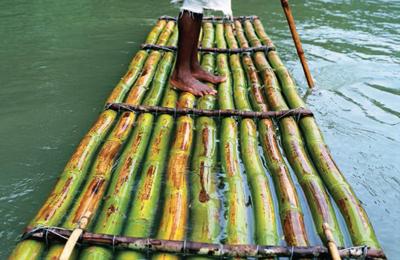Retracing our Ancestors’ first ocean voyages

Questions that have perplexed archaeologists about how and why our ancestors first arrived in Australasia by at least 60,000 years ago will be investigated by SMMI member, Dr Helen Farr.
Her project, ACROSS – Australasian Colonisation Research: Origins of Seafaring to Sahul, has been awarded €1.135m over five years and through this project, Helen wants to get to the bottom of why, after six million years of evolution, our human ancestors took to the sea at this point.
“For the last 10 years I’ve been looking into the global colonisation by our ancestors, and how seafaring played a role in that" said Helen, Lecturer in Archaeology.
“If boats from tens of thousands of years ago haven’t been preserved, how do we know that seafaring happened? One of the earliest signs is the archaeological evidence of anatomically modern humans in Australasia. That’s the first undisputed evidence that our ancestors must have used some sort of water transport as they moved Out of Africa and colonized the globe. What’s exciting is that depending on sea-level, this could have potentially involved crossing around 100 kilometres of water, so what does this mean to our understanding of skills and technology of Homo sapiens sapiens and the story of the peopling of our planet?.”
Her work is interdisciplinary and she will work closely with colleagues at the National Oceanography Centre to try to understand the sea-levels from 60,000 years ago, the palaeolandscape and what the marine environment was like – for example, were there strong tides and currents?
Through understanding this, Helen will be able to better understand the seafaring technology and skill that would have been necessary, as well as consider intentionality, risk and our ancestors’ desire to travel.
She will aim to discover how important it was for these people to cross into these new lands, questioning whether it’s simply human nature to want to travel over the horizon or whether the first seafarers were pushed to find new territory or resources.
In addition to the marine environmental lines of investigation, Helen will be working with the Archaeogenetics laboratory at the University of Huddersfield and the Wellcome Sanger Institute (genomics and genetics research institute near Cambridge).
“We have access to archives of genetic samples that provide another line of investigation into this story,” she added. “We’re going to be looking at the whole genome rather than just the mitochondrial DNA. Hopefully this will tell us quite a lot about the timing of colonisation and routing through the region, and that will lead to new questions about where we should be looking for archaeology.”
The project also includes Australian and Island South East Asian partners including the University of Western Australia and La Trobe University.
Helen will hire three post-doctoral researchers to work on ACROSS, one based in Ocean and Earth Science, one in Archaeogenetics and the other in Archaeology.
